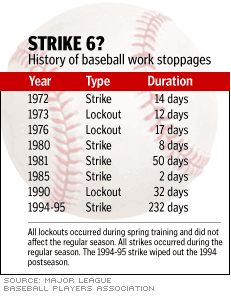
NEW YORK (CNN/Money) - It's too soon to say if baseball will avoid its sixth midseason work stoppage, though Friday's decision by players to impose an Aug. 30 strike deadline looks ominous enough. And it's too soon to say whether the owners or players will come out on top, though history suggests betting on the guys swinging the bats.
But it's not too soon to say what won't happen: the competitive balance of the sport will not be changed -- even if the owners get what they want.
Management likes to portray its demand for more sharing of ticket sales money and local broadcast fees between large revenue and small revenue teams, as well as a so-called luxury tax that penalizes teams with the largest payrolls, as the key to allowing small market teams a chance at the World Series.
 |
|
| Low revenue teams like the Kansas City Royals or Tampa Bay Devil Rays won't be competitive even if the owners get what they want from the players union. |
Those demands are really about cutting salaries and increasing profits. If the richer teams have to share more money, they won't be able to offer as much to top players, and salaries that now average $2.4 million will stagnate or fall. Management negotiator Rob Manfred, in a surprisingly candid moment this week, referred to the luxury tax proposal as "salary regulation."
But don't think that regulation will lead to a Milwaukee Brewers-Tampa Bay Devil Rays World Series showdown anytime soon.

The fact is that baseball is already sharing more than $500 million among large and small market teams under the current labor agreement -- about 20 percent of all local revenue, with the smaller market teams getting more of the pie. Yet there are cries from sports writers and fans that the playing field has never been more tilted against the little guys.
A big part of that perception is that the poster child for large-market wealth, the New York Yankees, have played in five of the last seven World Series and have won four.
But that's due in part to the increased number of teams that participate in baseball's post-season since 1995. If baseball hadn't expanded the playoffs, the Yankees, with only a second-place record, would have sat out two Octobers -- 1996 and 2000 -- in which they won the championship.
| |
 SportsBiz
SportsBiz
| |
| | |
| | |
|
No one seriously argues that having fewer teams in the playoffs will restore balance, but neither will the owners' "salary regulation." The truth is there has never really been competitive balance -- some badly-run teams in smaller markets have always had trouble competing. In fact, small market is often just baseball code for poorly-run.
The doormats of the American League, the Tampa Bay Devil Rays, take in $15.5 million in local broadcast revenue. That's more than either the St. Louis Cardinals or world champion Arizona Diamondbacks get.
| |
 Related stories
Related stories
| |
| | |
| | |
|
At the other end of the scale consider the Seattle Mariners. The team was on the verge of leaving the city in 1995 and has lost three future hall of fame players it couldn't afford to pay. Now the franchise may be the most profitable in baseball and won an American League record 116 games last year.
The fact that the Yanks beat the Mariners in the playoffs is proof that anything can happen in a short series, not of some predetermined competitive imbalance. And getting the union to agree to greater penalties on well-run franchises won't make the people who run bad teams any smarter.

|

